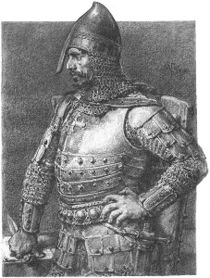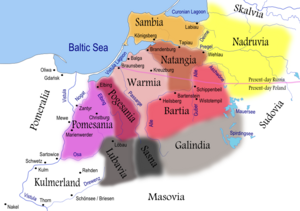Konrad I of Masovia
| Konrad I of Masovia | |
|---|---|
 |
|
| Konrad I. Drawing by Jan Matejko | |
|
|
|
| Reign | 1229-1232 |
| Predecessor | Mieszko IV Tanglefoot |
| Successor | Henry I the Bearded |
|
|
|
| Reign | 1194-1247 |
| Predecessor | Leszek I the White Helen of Znojmo (regent) |
| Successor | Boleslaw I of Masovia |
| Spouse | Agafia of Rus |
| Issue | |
| Boleslaw I of Masovia Casimir I of Kuyavia Siemowit I of Masovia Eudoxia, Countess of Wettin Judith, Duchess of Wrocław |
|
| House | House of Piast |
| Father | Casimir II the Just |
| Mother | Helen of Znojmo |
| Born | c.1187/88 |
| Died | 31 August 1247 |
Konrad I of Masovia (Polish: Konrad I Mazowiecki; 1187? – 1247), son of Casimir II and Helen of Moravia, was the 6th Duke of Masovia.
After his father's death in 1194, Konrad was brought up by his mother. In 1199 he received Masovia and in 1202, Kuyavia. In 1205, he and his brother, Leszek I the White, had their greatest military victory at Battle of Zawichost against Roman the Great. The Ruthenian army was crushed and Roman was killed in battle. The Russian princess Agafia of Rus became his wife. His maternal grandmother (the princess-consort of Moravia, Znaim (part of the Holy Roman Empire)) was one Maria of Serbia, apparently a daughter of the pre-Nemanjic Zhupan dynasty.
Contents |
Attempted conquests of Prussia
Konrad unsuccessfully attempted to conquer pagan Prussia in a 1209 crusade and several times after [1], 1219, 1222 Pg 45. On the advice of the first bishop Christian of Prussia, Christian of Oliva, in 1220 he founded the Order of Dobrin (Order of Dobrzyń) and was again defeated. Ongoing attempts on Prussia were answered by incursions across the borders of his lands, while Prussians were in the process of gaining control over the territory of Chełmno Land. Subjected to constant Prussian raids and counter-raids, Konrad now wanted to stabilize the north of the duchy of Masovia in this fight over border area of Chełmno Land.
The Teutonic Order

Thus in 1226, Konrad having difficulty with constant raids over his territory, invited the religious military order of Teutonic Knights to fight the Prussians, as they already had supported Hungary from 1211 to 1225. When the Order notified Hungary that they are firstly responsible to the pope, the Order was expelled by the Hungarian king though. Thus, in turn for its service, the Order wanted to have its rights documented beforehand, by a deal with Konrad that was to be confirmed by the Emperor and the Pope.
Holy Roman Emperor Frederick II issued in March 1226 the Golden Bull of Rimini, stating [2] that:
- "brother Konrad had offered and promised to furnish brother Herrmann, Honorable Master of the Holy Hospital of St. Mary of the Germans in Jerusalem (Teutonic Order).. with the Culmensis[1] Land between his march and the Prussians and equip them (T.O.) well, so they may take Preussenland (Terra Prussiae) in possession... we recognize the fact, that this land is included in the realm of the empire, we trust the judgement of the Master... we recognize all land in Prussia as an ancient right of the empire ...".
In 1230, the Treaty of Kruszwica was supposedly signed, according to which Konrad granted Chełmno Land to them, and to the Order of Dobrzyń. This document does not exist however, and it is believed [2][3] that it was never signed and the Order might have forged it.
In 1234, the pope issued the Golden Bull of Rieti, confirming the prior deals, stating that the land of the Order was only subject to the Pope, not a fief of anybody.
Konrad's legacy
Konrad is blamed by Poles, that 'his actions began the process whereby the Teutonic Knights came to control much of the Baltic coastline through their monastic state, that had ultimately dire consequences for the Polish state'.
Konrad and Agafia had the following children:
- Boleslaw I of Masovia (c. 1210-17 April 1248), Duke of Mazovia (1247--1248)
- Casimir I of Kuyavia (born between 1210 and 1213Died. 14 Dec 1267) Prince of Kuyavia (1247-1267)
- Siemowit I of Masovia (c.1213-24 June 1262), succeeded eldest brother as Duke of Mazovia (1248-1262)
- Eudoxia (1215-1240) - The wife of Count Breny I of Wettin
- Ludmila (born before 1225)
- Ziemomysł (born between 1216 and 4 Jul 1228 Died between 10 July and 18 September 1241)
- Salomea (born between 1220 and 1225 died after 30 August 1268), nun
- Judith (born between 1222 and 1227Died. 4 Dec between 1257 and 1263) - married firstly to Mieszko II the Fat. Secondly to Henry III the White
- Dubrawka (c. 1230-1265)
- Mieszko (b. 1235), died in infancy.
See also
- History of Poland (966-1385)
Notes
- ↑ KDMaz. Koch., nr 238, s. 249-254.
- ↑ Boockmann, p. 97
- ↑ Bernd Martin, p. 24
References
- Altes Preussenland before 1200
- (German) Hartmut Boockmann, "Deutsche Geschichte im Osten Europas. Ostpreußen und Westpreußen", Berlin 1992
- (German) Bernd Martin, "Masuren, Mythos und Geschichte", Evangelische Akademie Baden, Karlsruhe 1998
- Catholic Encyclopedia Innocent III resolved (1207) to organize a new crusade...Instead of concentrating the forces of Christendom against the Mohammedans, the pope himself disbanded them by proclaiming (1209) a crusade against the Albigenses in the south of France, and against the Almohades of Spain (1213), the pagans of Prussia, and John Lackland of England.
- Konrad of Masovia sent Polish crusaders against Prussian after 1209
| Preceded by Leszek I the White |
Dukes of Masovia 1194-1247 |
Succeeded by Boleslaw I of Masovia |
|
||||||||||||||||||||||||||